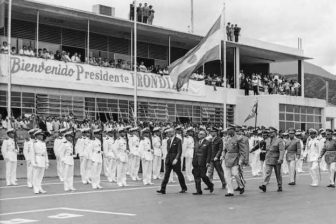Many in Washington and elsewhere are convinced that something needs to be done urgently to give Venezuelans any chance of organizing an orderly national effort to prevent a coronavirus catastrophe. Sanctions relief figures prominently in their thinking.
This week the Trump administration announced a detailed roadmap for the restoration of democracy in Venezuela that could lead to the progressive removal of sanctions. The plan is not perfect, but it certainly seems to move in the right direction. It requires compromise by all of the interested parties, including the United States. It offers a step-by-step program for relief from the punitive measures the U.S. has imposed on Venezuela as the country spiraled into authoritarianism and its economy collapsed. Anyone interested in the welfare of the Venezuelan people who has followed the progressive decline of Venezuela over the last few years will understand that the country is profoundly vulnerable at the present moment.
The plan requires Nicolás Maduro, the strongman successor to Hugo Chávez who still holds power in Venezuela, to step aside – and for Juan Guaidó, the president of the National Assembly who is recognized as the legitimate interim president by more than 50 countries, to do so as well. Power would be transferred to the legislature, which would select a temporary national government and, eventually, hold free and fair elections. The regime’s party, the PSUV, which holds seats in the National Assembly, would be permitted to participate in all phases of the project and the military would be given a role in the transition process.
This takes place against the backdrop of the coronavirus pandemic, which looms on the horizon as a disaster of truly biblical proportions. The country is entirely unprepared to cope. Reports of shortages of food and medicine in Venezuela began to circulate years ago and persist to this day. Even social distancing will be impossible, since most Venezuelans do not have enough food and medicine on hand to stay home.
Unfortunately, absent at least some of the changes envisioned in the U.S. plan, choreographing an effective, non-partisan response to the pandemic threat is probably not possible – and that is not because the U.S. has imposed sanctions on the Maduro regime. In fact, as circumstances inside the country deteriorated in recent years, the U.S. looked for ways to address the humanitarian disaster perpetrated on the Venezuelan people by the sustained incompetence of the Chávez and Maduro administrations over the last 20 years.
As news photos of empty supermarket and pharmacy shelves shocked the region and the world, the U.S. began shipping massive amounts of humanitarian aid into the region. The intent was to help the displaced stranded in neighboring countries and to assist those suffering inside Venezuela’s borders. The obstacle to the successful distribution of aid directly in Venezuela was and remains the Maduro regime which, initially, resisted even acknowledging there was a crisis at all. The regime blocked U.S. assistance from entering the country while at the same time using distribution of scarce food and medicine to control and reward their base.
Going forward they clearly cannot be trusted to handle emergency aid. Moreover, ceding that role to the regime would provide them with the wherewithal to strengthen their grip on power. At the same time, the regime has blocked efforts to get the stockpiled assistance into the hands of Guaidó and his supporters.
Of course, the problems are not now only political. Venezuela is already in the grip of a multifaceted crisis. Infrastructure is so dilapidated that most hospitals do not have reliable supplies of electricity or even water. Much of the medical equipment has deteriorated and a distressingly large number of medical professionals have abandoned the country.
The bottom line is that those presently in control in Caracas cannot be trusted to mount the sort of all-out, non-partisan effort needed to address the country’s humanitarian crisis. Those who would willingly partner with an international humanitarian mission would not be permitted to do so by the regime. Unfortunately, the massive relief effort which the Venezuelan humanitarian and health crisis demands will not be possible until Maduro and company cede power – and they will not cede power to Guaidó.
Having the leaders of both the regime and the opposition step aside to permit new elections would clear the way for a coordinated effort – and make renewed partnership with the international community possible. That is a way to stop an even greater disaster, and time is running out.
—
Duddy served as the U.S. ambassador to Venezuela from 2007 to 2010. Retired from the State Department, he now teaches at Duke University where he is the director of its Center for Latin American and Caribbean studies







